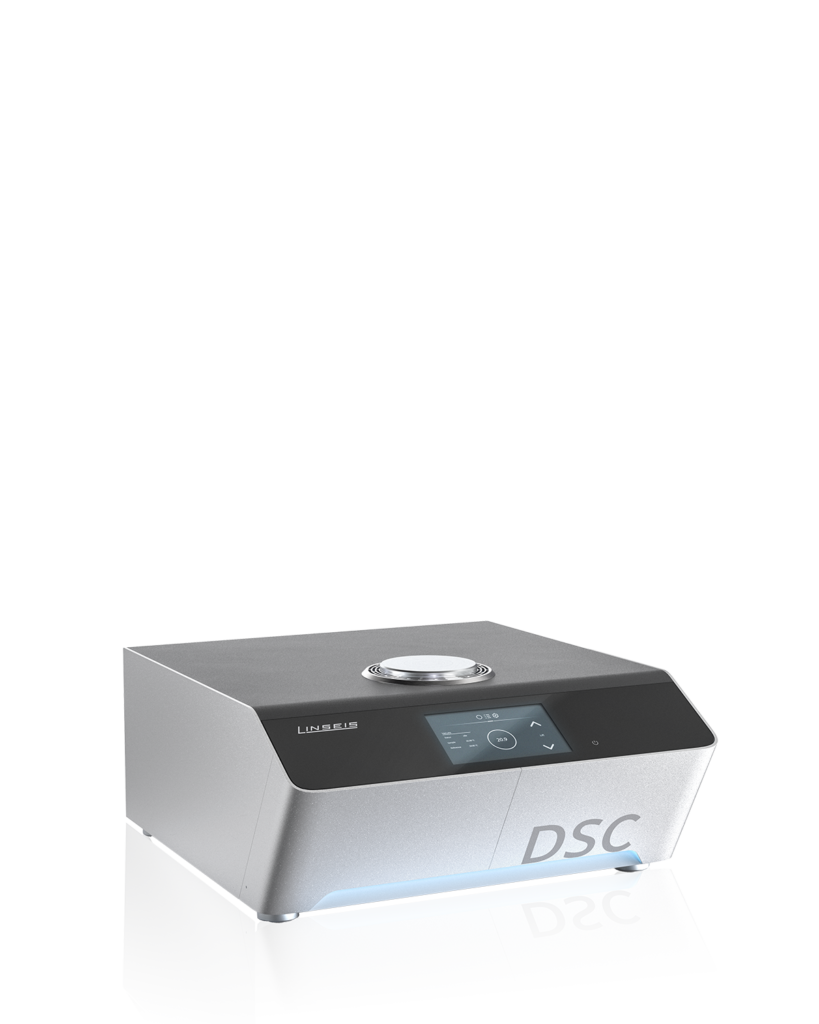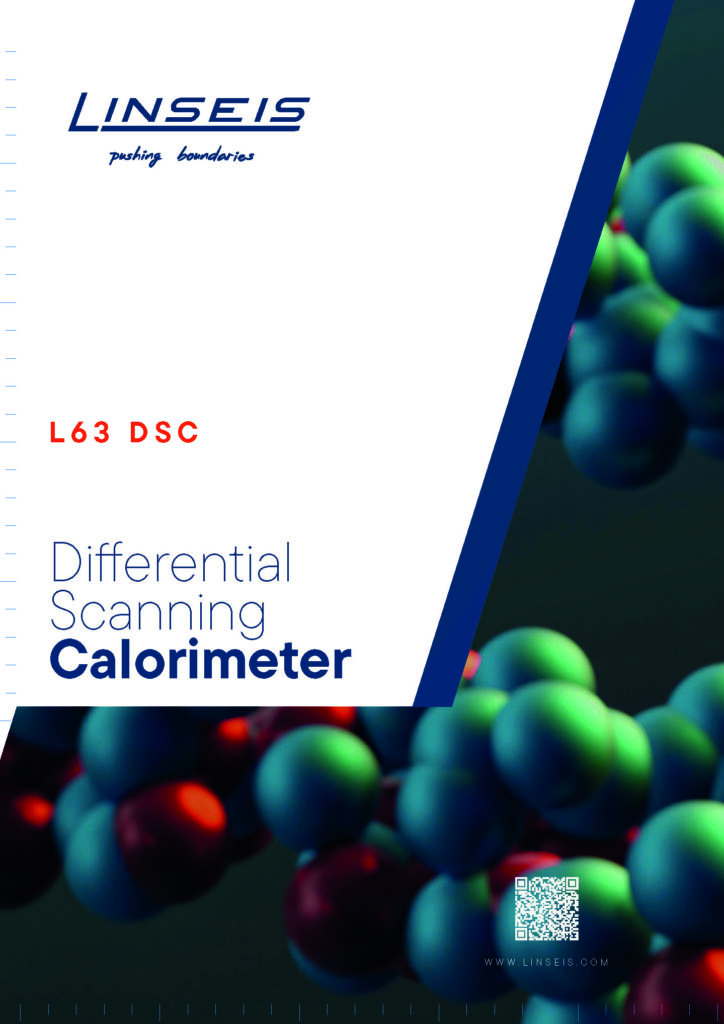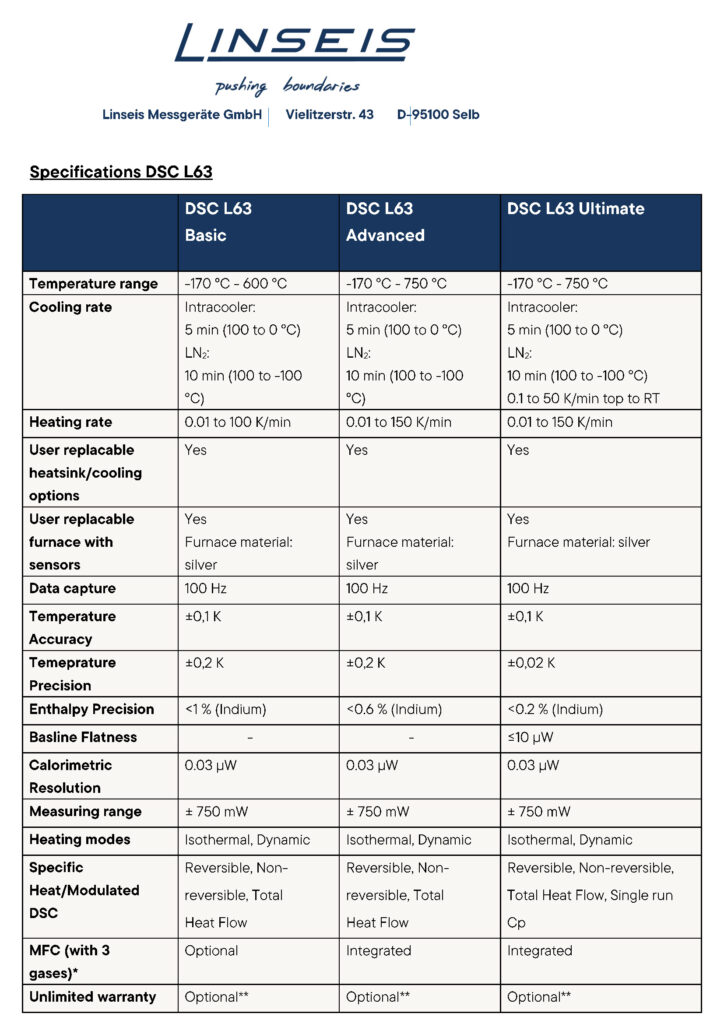DSC L63: High-sensitivity differential scanning calorimetry
The LINSEIS DSC L63 is a high-performance DSC for precise analysis of endothermic and exothermic transitions, from glass transitions and melting to crystallization, curing and oxidation stability. With outstanding sensitivity and resolution, temperature-modulated DSC (MDSC) for separating reversible and non-reversible effects, and a wide temperature range from −170 °C to 750 °C in a single setup, it delivers reliable results for research, development and quality control across polymers, pharmaceuticals, food and metals. Flexible hardware options include interchangeable cooling (intracooler or LN₂) and a 90-position autosampler to maximize throughput, while the silver furnace and true heat-flow design ensure accuracy and reproducibility.
Unique Features

Measurement Performance & Sensitivity
Unmatched sensitivity – Detects even extremely weak thermal events, such as subtle glass transitions or minor crystallization steps, ensuring critical details are not overlooked in research or quality control.
Benchmark resolution – Enables precise separation of closely overlapping thermal events, allowing for accurate analysis of complex material behaviors.
True heat flow design – Uses a direct, quantitative heat flow measurement principle for reproducible, noise-free data, trusted in both academic and industrial applications.
High-performance silver furnace – The silver construction provides outstanding thermal conductivity, ensuring fast and uniform temperature distribution, while interchangeable sensors adapt the system to specific measurement needs.
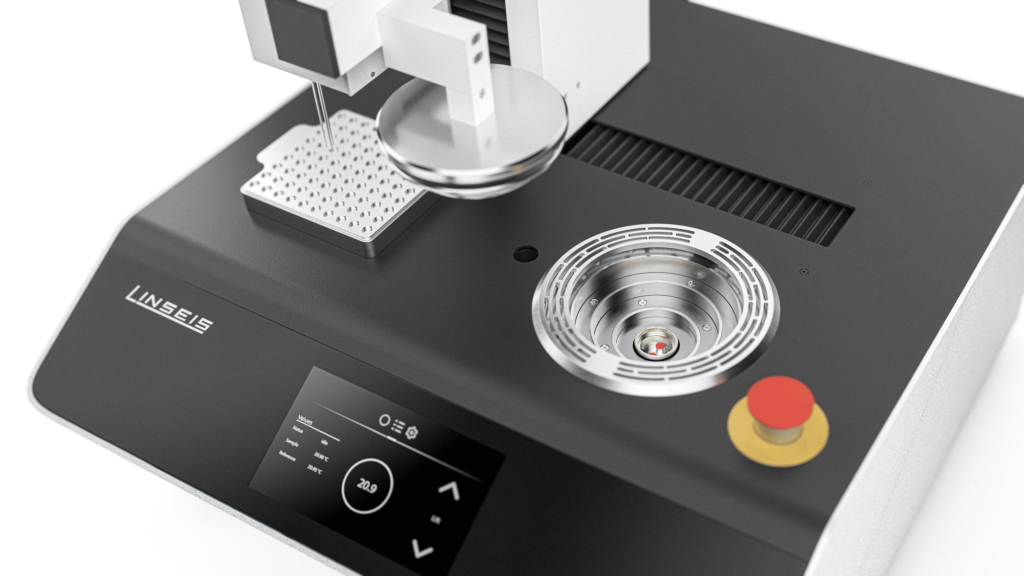
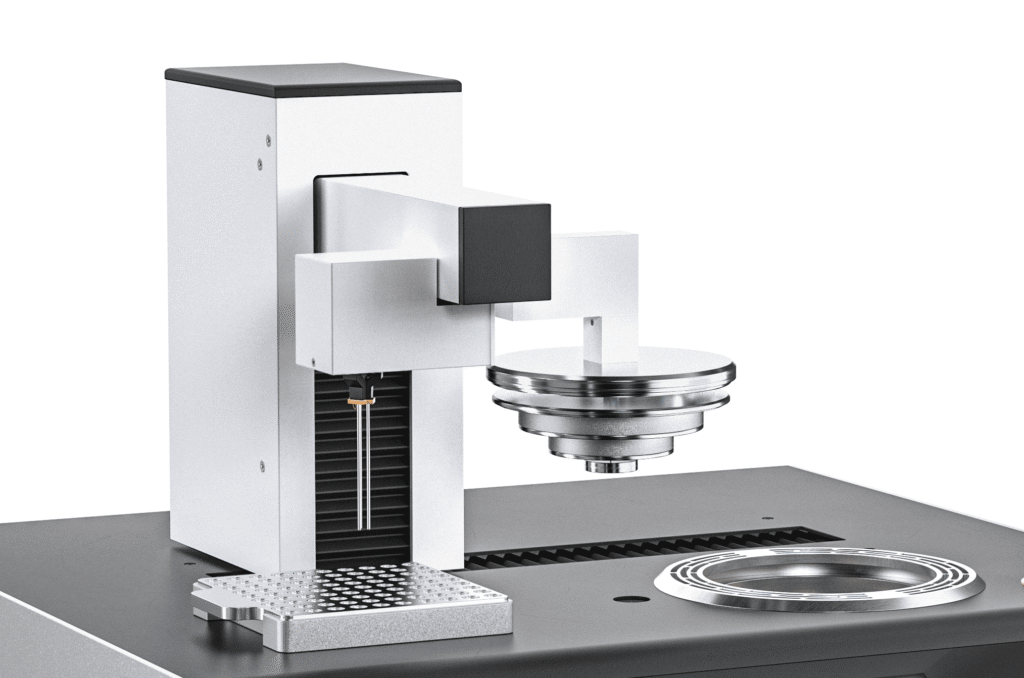
Advanced Measurement Capabilities
Modulated DSC (MDSC) – Separates reversible effects (e.g., melting, glass transitions) from non-reversible ones (e.g., crystallization, enthalpy relaxation) and enables highly precise Cp determination, improving interpretability of complex results.
Optical DSC capability – An optional CCD camera records the sample visually during measurement, giving direct insight into physical changes alongside the thermal data.
UV-curing DSC – Performs photocalorimetric measurements under UV light, ideal for studying fast curing processes in adhesives, coatings, and polymer systems.
Standards compliance
Fully compliant with international testing standards including ASTM, DIN, and ISO, ensuring that results are recognized, comparable, and accepted worldwide. This compliance guarantees that the DSC L63 can be integrated seamlessly into standardized quality control workflows, certification procedures, and regulatory submissions. By following these established norms, laboratories can confidently compare data across different instruments, facilities, and industries without the risk of methodological inconsistencies.
High-throughput automation
The optional 90-position autosampler allows fully automated measurements, enabling laboratories to run large sample batches overnight or during weekends without supervision. This significantly increases instrument utilization, reduces operator workload, and ensures a continuous flow of results even outside regular working hours.
Software improvements
Lex Bus Plug & Play
Our latest hardware interface Lex Bus revolutionizes data communication within our systems.
Lex Bus enables the seamless and efficient integration of new hardware and software tools.Improved furnace control
Our new and further optimized oven control system allows even more precise temperature control.
The result: more precise temperature control – exactly according to your wishes and requirements – and therefore better measurement results.New software with user interface
Our communication is now even more focused on your needs:
You are always informed about the current status and receive targeted support whenever it is needed.Process reliability
Our software has been optimized for maximum process security: Your data is protected at all times and can be processed in a fail-safe manner.Error messages and bug fixes
The system automatically detects errors and problems, documents them immediately and fixes them as quickly as possible – for minimal downtime.Online updates and new functions
Regular automatic software updates not only improve security, but also continuously bring new functions.Permanent system monitoring
The software permanently monitors all system parameters – for optimum performance at all times.Preventive maintenance and problem detection
Our preventive maintenance approach detects problems and wear at an early stage, before damage occurs – to keep your appliance in top form for the long term.
LiEAP software
Delivered with the powerful LiEAP software, which combines an extensive material database, automatic product recognition, and Python scripting support for advanced analysis. The intuitive, multilingual interface ensures ease of use for both experienced analysts and new users, while integrated automation functions streamline experiment setup, execution, and evaluation.
Highlights



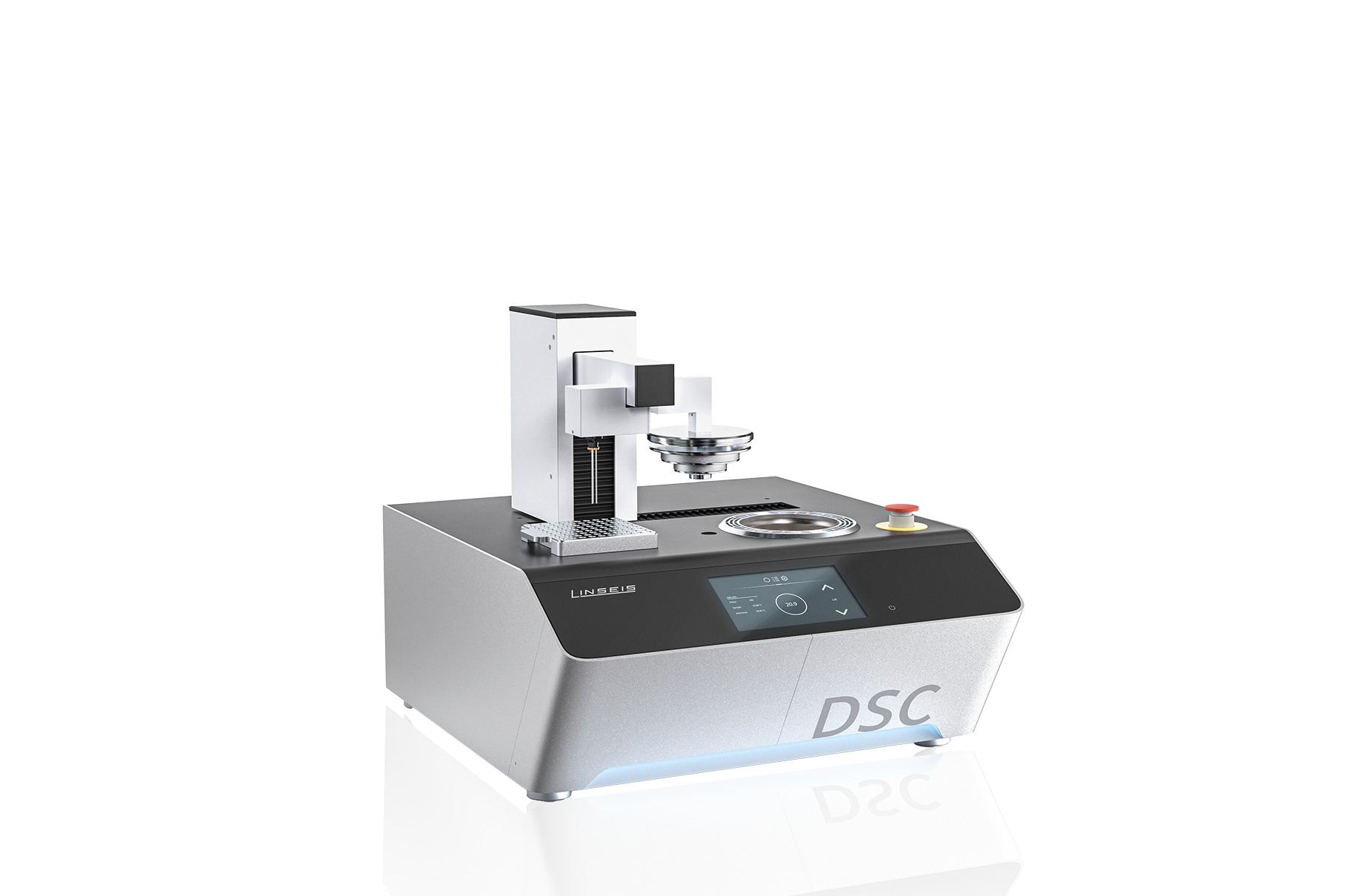
High-performance sensor
Wide temperature range
Robust design
Versatile
application options
Key Features

Wide temperature range
Covers −170 °C to 750 °C without changing cooling hardware, suitable for applications from low-temperature polymers to high-temperature metals and ceramics.

Sample robot
Our DSC L63 can be equipped with a proven sample robot that enables unattended sample measurements – for maximum sample throughput.

Flexible cooling options
Interchangeable cooling block supports both liquid nitrogen (LN₂) and mechanical intracooler operation, depending on laboratory needs.

Integrated LINSEIS platform
The integrated LINSEIS software offers a comprehensive solution that combines hardware and software for maximum process reliability and precision. The standardized platform enables seamless integration of components and devices from external partners – for a particularly robust and reliable overall system.
Questions? We're just a call away!
+01 (609) 223 2070
+49 (0) 9287/880 0
Our service is available Monday to
Thursday from 8 am to 4 pm
and Friday from 8 am to 12 pm.
We are here for you!
Specifications

Temperature range: -170°C to 750°C

9 different crucibles available

Starter-Kit included with every DSC L63
Discover our high-performance DSC – developed for maximum sensitivity and versatility:
- Temperature range: −170 °C to 750 °C (without hardware change)
- Heating rates: 0.01 to 150 K/min
- Temperature accuracy: ±0.1 K
- Enthalpy precision: <1 % (Indium, Zink)
- Cooling options: Liquid nitrogen (LN₂) or mechanical intracooler, fast cooling up to 100 K/min (to 560 °C)
- Automation: Optional 90-position autosampler for unattended operation
- Special measurement modes: Modulated DSC (MDSC), Optical DSC, UV-curing DSC
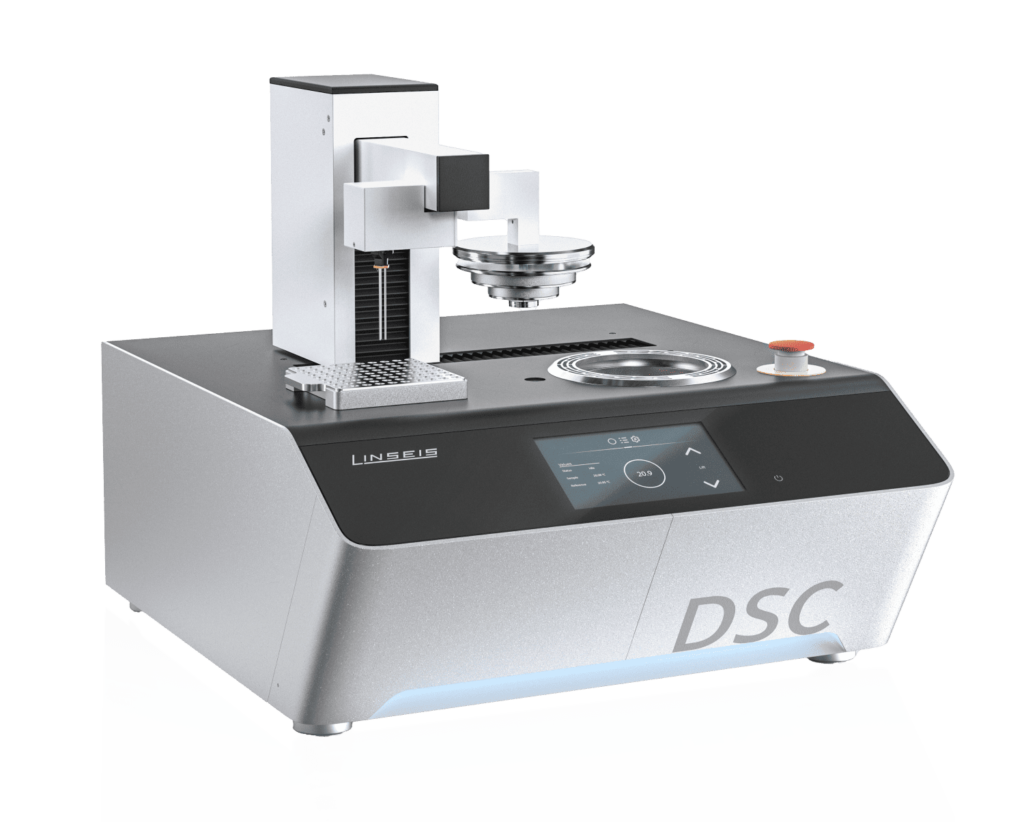
Cooling Options
DSC L63 Basic
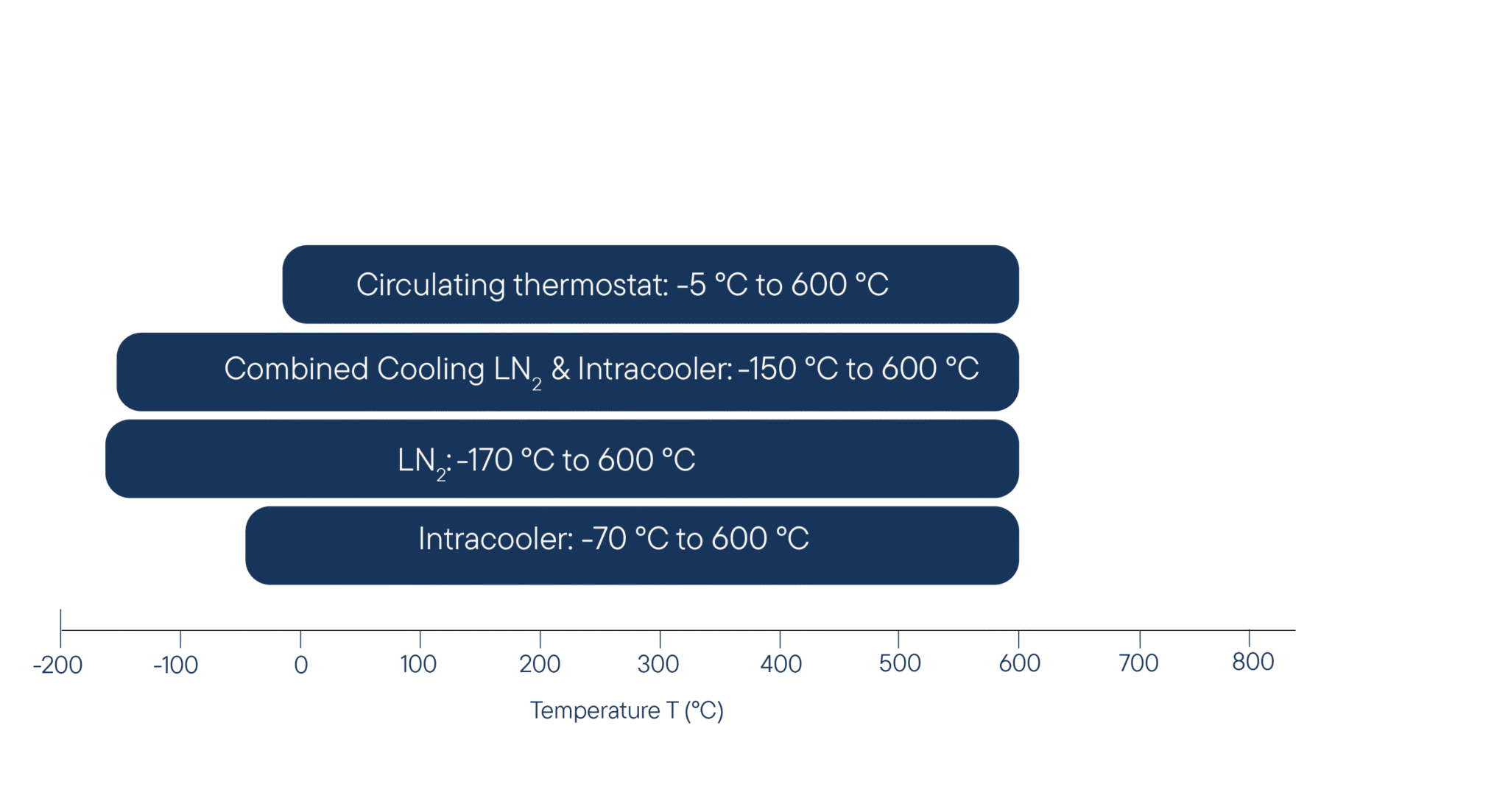
DSC L63 Advanced
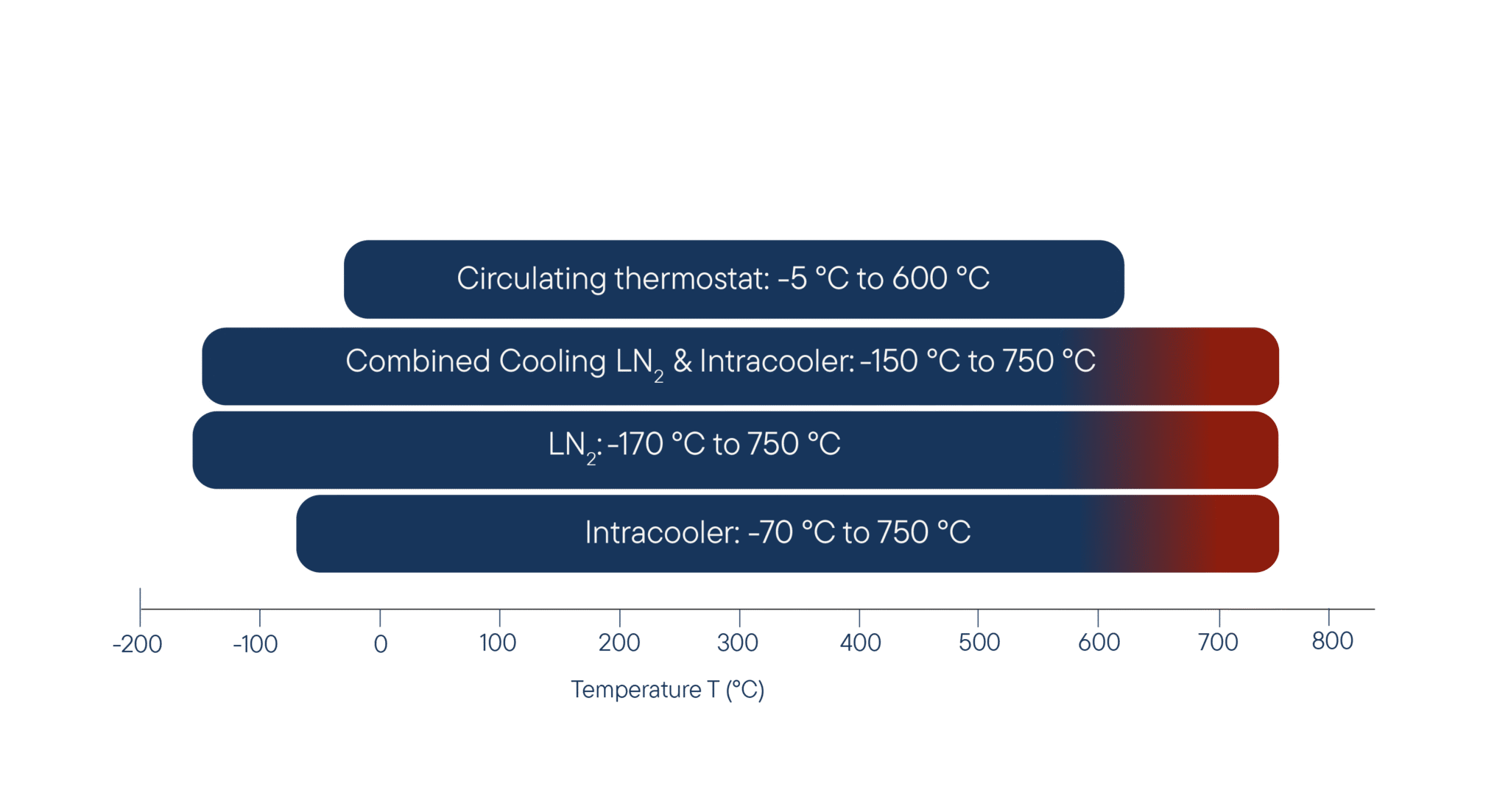
Hardware Options
Sample Robot DSC
The sample robot for up to 90 samples increases the productivity significantly. The instrument can run automatically overnight or at the weekend. Together with the intuitive and intelligent software it reduces labour costs and saves time.
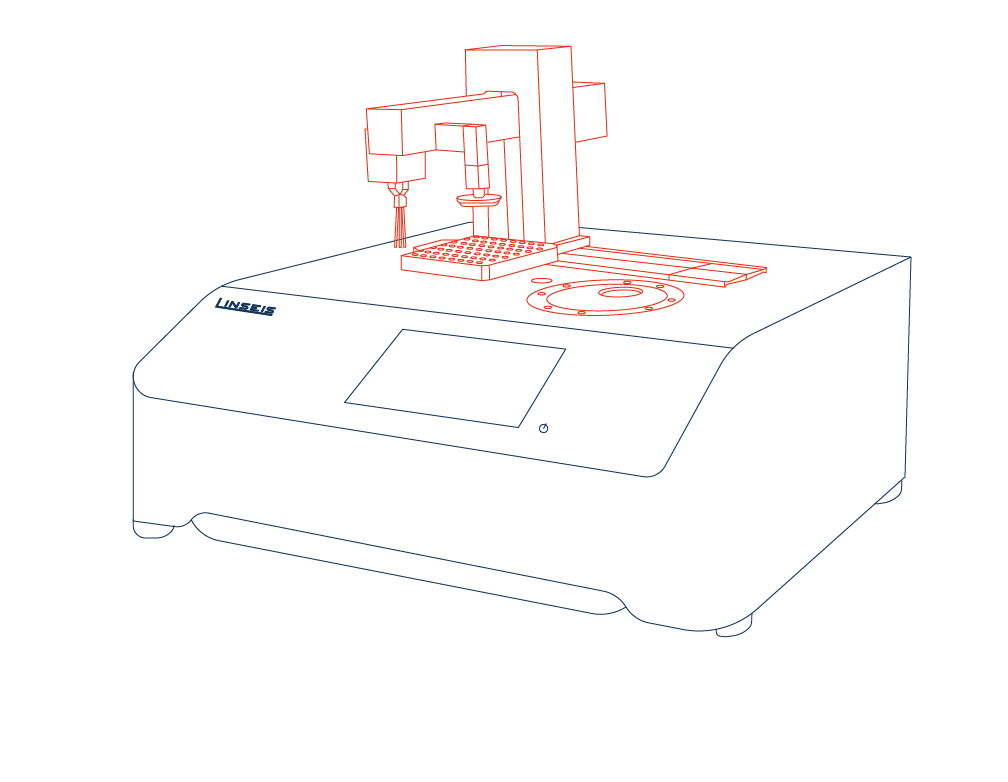
Optical DSC
The L63 DSC can be equipped with a CCD camera to observe the sample during the measurement. The visualization of the sample gives a much
deeper insight to phase transitions and decomposition processes.
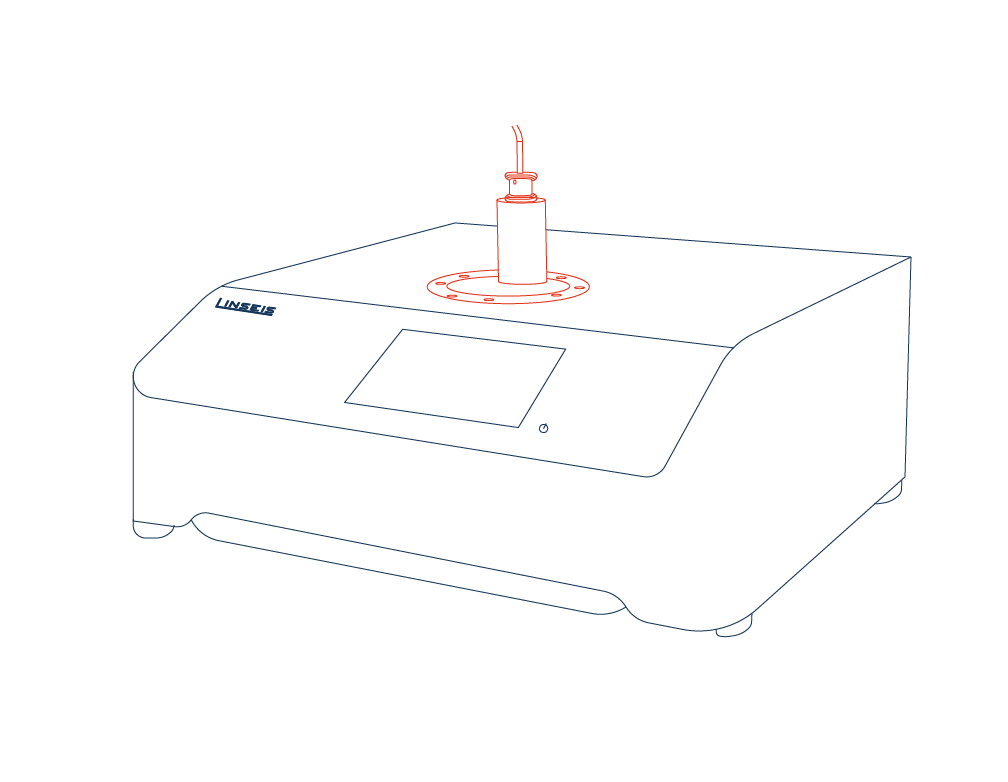
UV curing DSC
The Photo cell allows measurements under UV light to investigate UV curing systems. Due to the very short time constant, also fast UV curing reactions in the smallest time scale can be measured.

Method
Differential Scanning Calorimetry
Differential Scanning Calorimetry (DSC) is a thermal analysis technique used to measure heat flows associated with physical or chemical changes in a material as a function of temperature or time. In a DSC measurement, both the sample and a reference are subjected to the same controlled temperature program, while the instrument continuously records the difference in heat flow between them.
This approach allows the precise detection of endothermic events, such as melting or glass transitions, and exothermic processes, such as crystallization or curing reactions. Because the heat flow is recorded directly under identical conditions, even subtle transitions can be quantified with high accuracy. These results are essential for quality control, material development, and research, enabling the prediction of product performance under real-world conditions.
With the DSC L63, advanced options such as Modulated DSC (MDSC) allow reversible and non-reversible processes to be distinguished, further improving data interpretation. The method is suitable for a wide range of materials, including polymers, metals, ceramics, pharmaceuticals and food products, offering reproducible and comparable results across diverse applications.
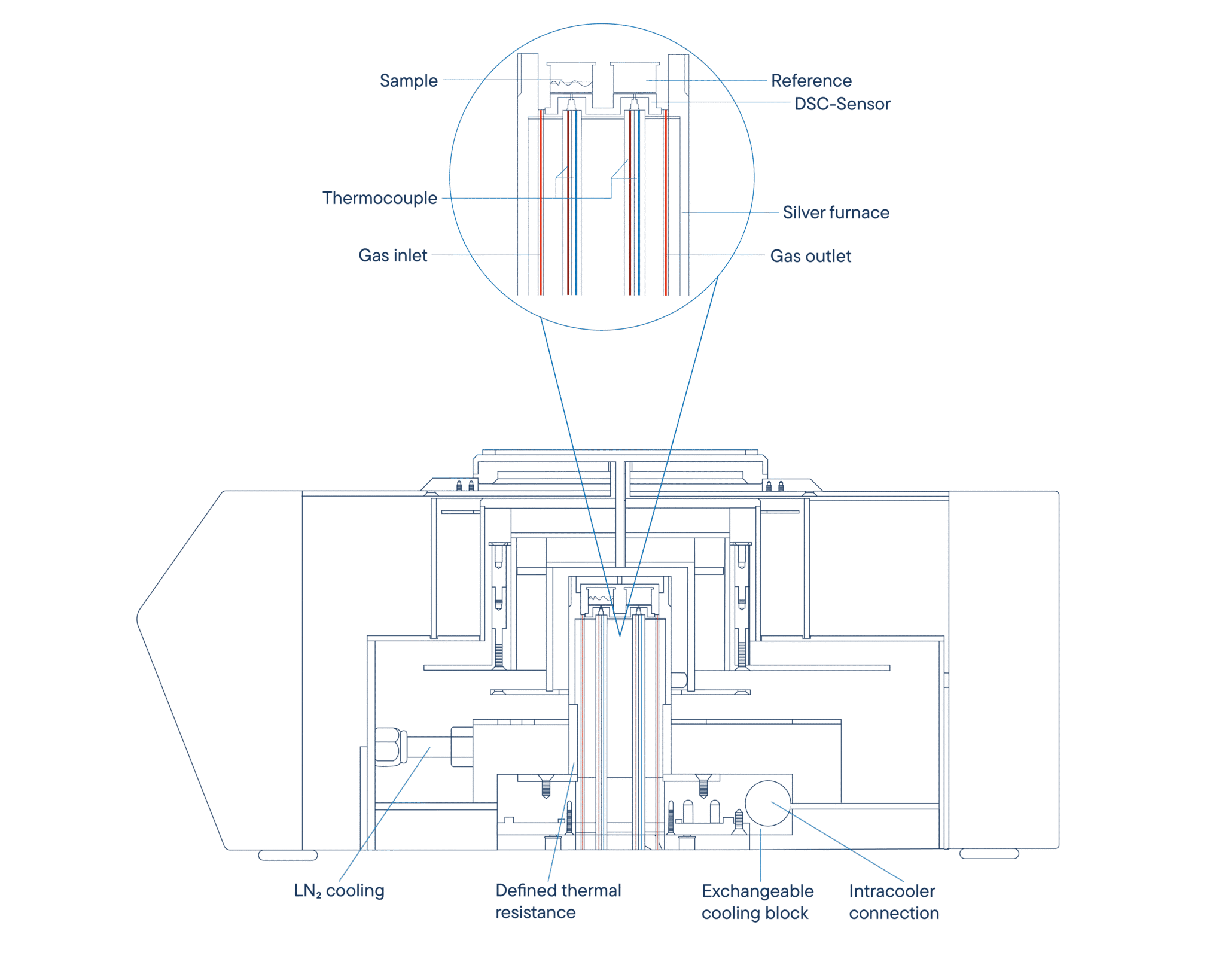
Functional principle of the DSC L63
The DSC L63 measures the heat flow difference between a sample and a reference material during a precisely controlled heating or cooling program. Both are placed in separate crucibles inside a temperature-controlled furnace and subjected to identical conditions.
Throughout the entire temperature cycle, the DSC L63 continuously records one key measured variable:
- Heat flow – Endothermic and exothermic events such as melting, crystallization, glass transitions, curing reactions or oxidation are detected by changes in heat absorption or release.
With its true heat flow design, high-performance silver furnace, and advanced electronics, the DSC L63 provides highly accurate, reproducible results. Optional Modulated DSC (MDSC) enables the separation of reversible and non-reversible processes, offering deeper insight into complex material behaviors.
Measured variables with Differential Scanning Calorimetry
Possibilities of thermal analysis using DSC:
- Specific heat capacity (Cp)
- Melting and crystallization behaviour
- Glass transition
- Degree of crystallinity
- Oxidation stability
- Change in the heat flow
- Endothermic and exothermic transitions
- Determination of enthalpy
- Liquids relationship
- Product identification
- Thermal stability
- Solidus relationship
- Purity
Questions? We're just a call away!
+01 (609) 223 2070
+49 (0) 9287/880 0
Our service is available Monday to
Thursday from 8 am to 4 pm
and Friday from 8 am to 12 pm.
We are here for you!
DSC L63 explained - use, capabilities and frequently asked questions
Modulated DSC
Differential Scanning Calorimetry (DSC) is an established method for analysing thermal transitions and reactions in materials. In classic DSC, measurements are taken at a constant heating rate, recording the entire heat flow generated by endothermic or exothermic processes. This provides reliable information about melting, glass transitions or crystallisation, for example.
Modulated DSC (MDSC) extends this principle: an additional sinusoidal temperature modulation allows the measured heat flow to be separated into reversible (e.g. glass transitions, melting) and non-reversible components (e.g. crystallisation, relaxation).
This makes it easier to differentiate between overlapping effects – a significant advantage for complex materials or weak transitions.
The precise determination of specific heat capacity (Cp) is particularly valuable in the study of polymers, composites and many others, as it reflects the material’s ability to store thermal energy.
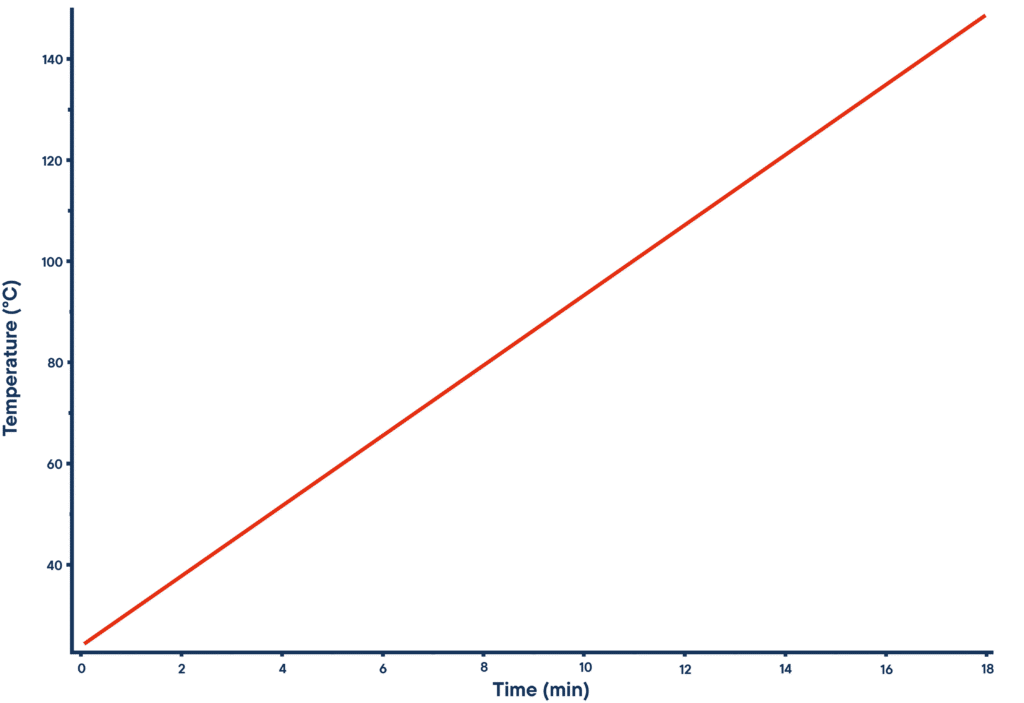
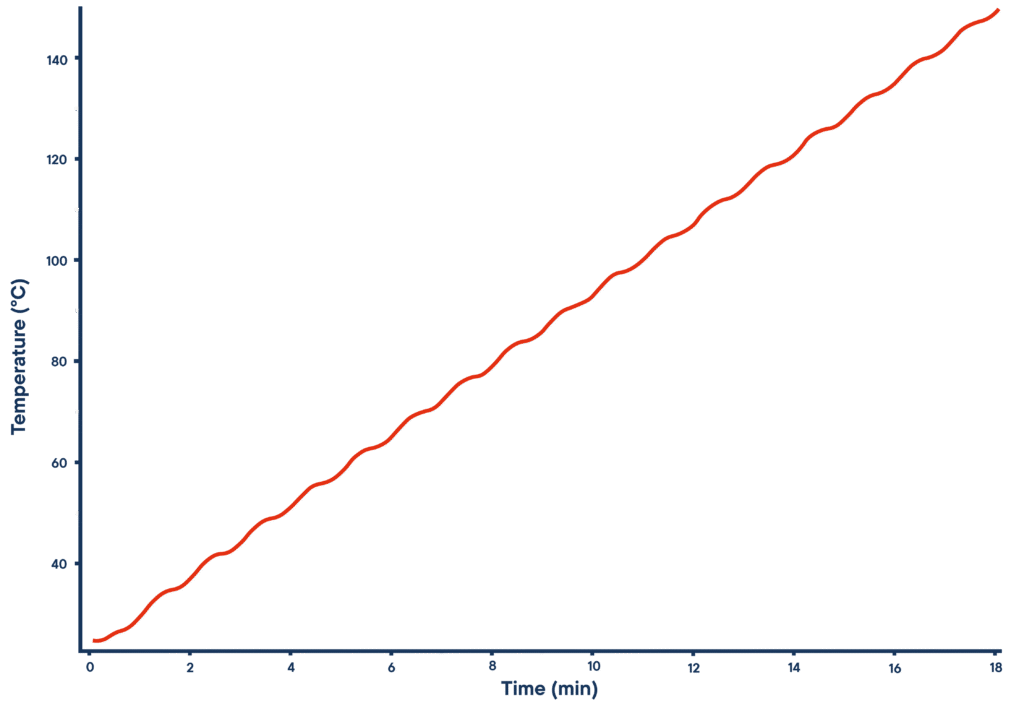
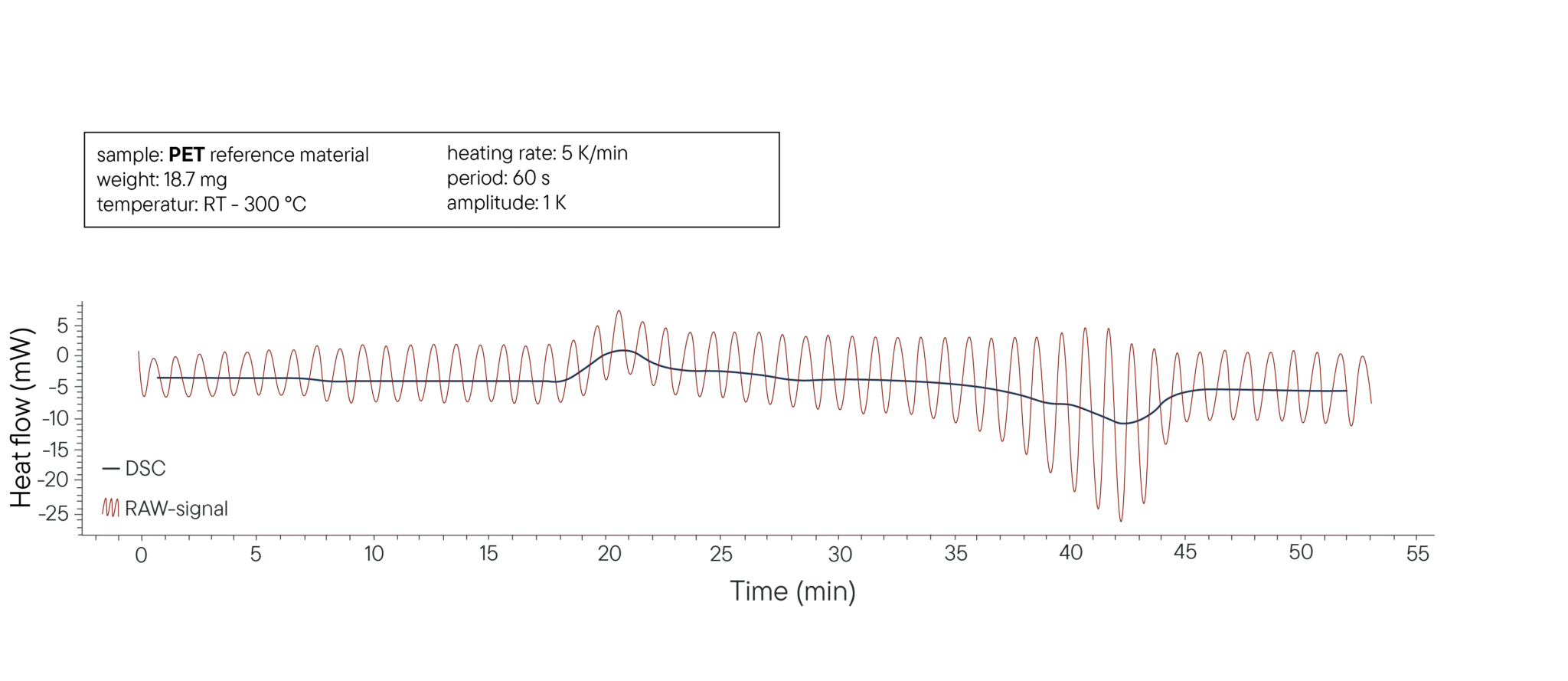


Available crucibles
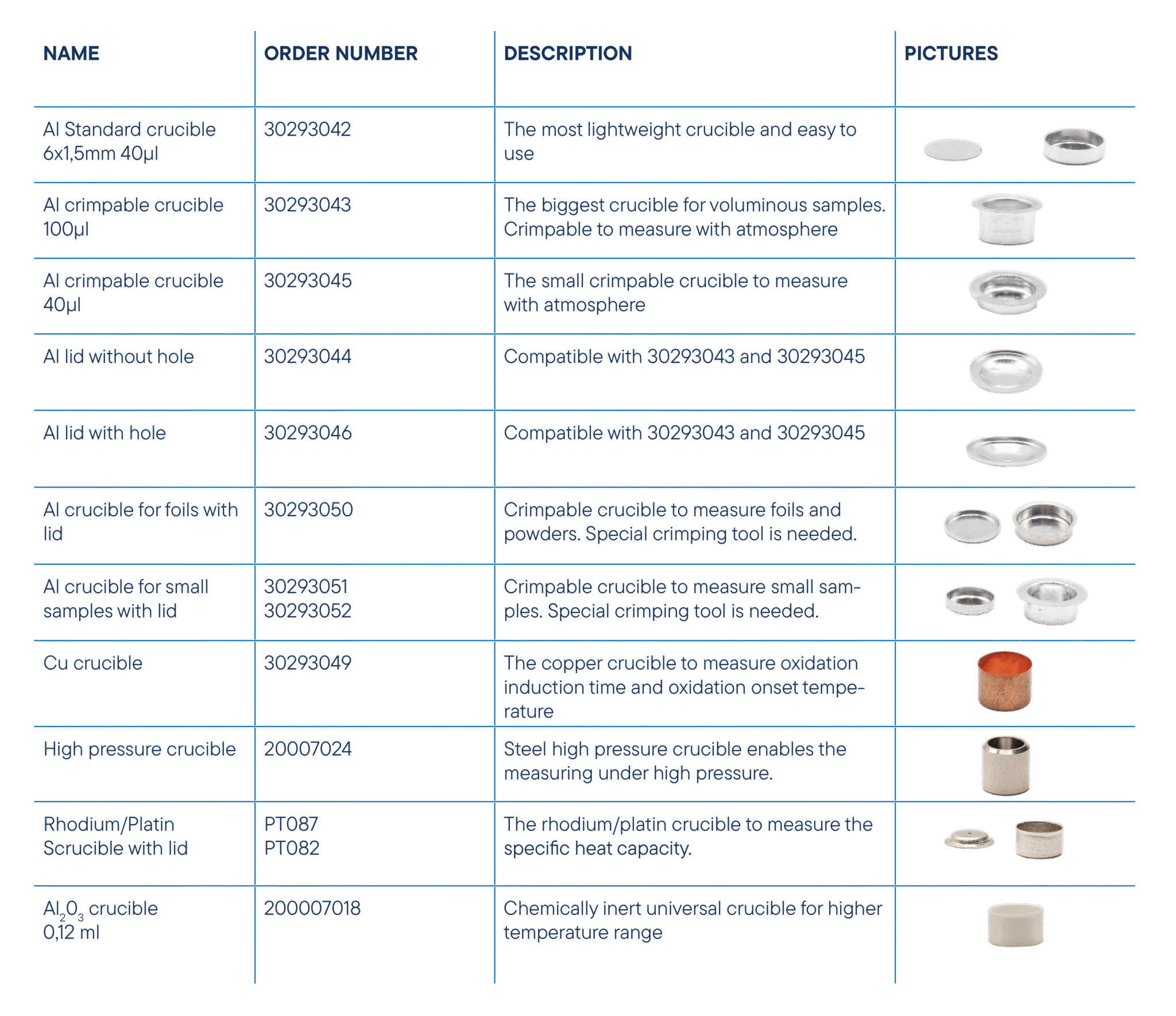
Starter Kit
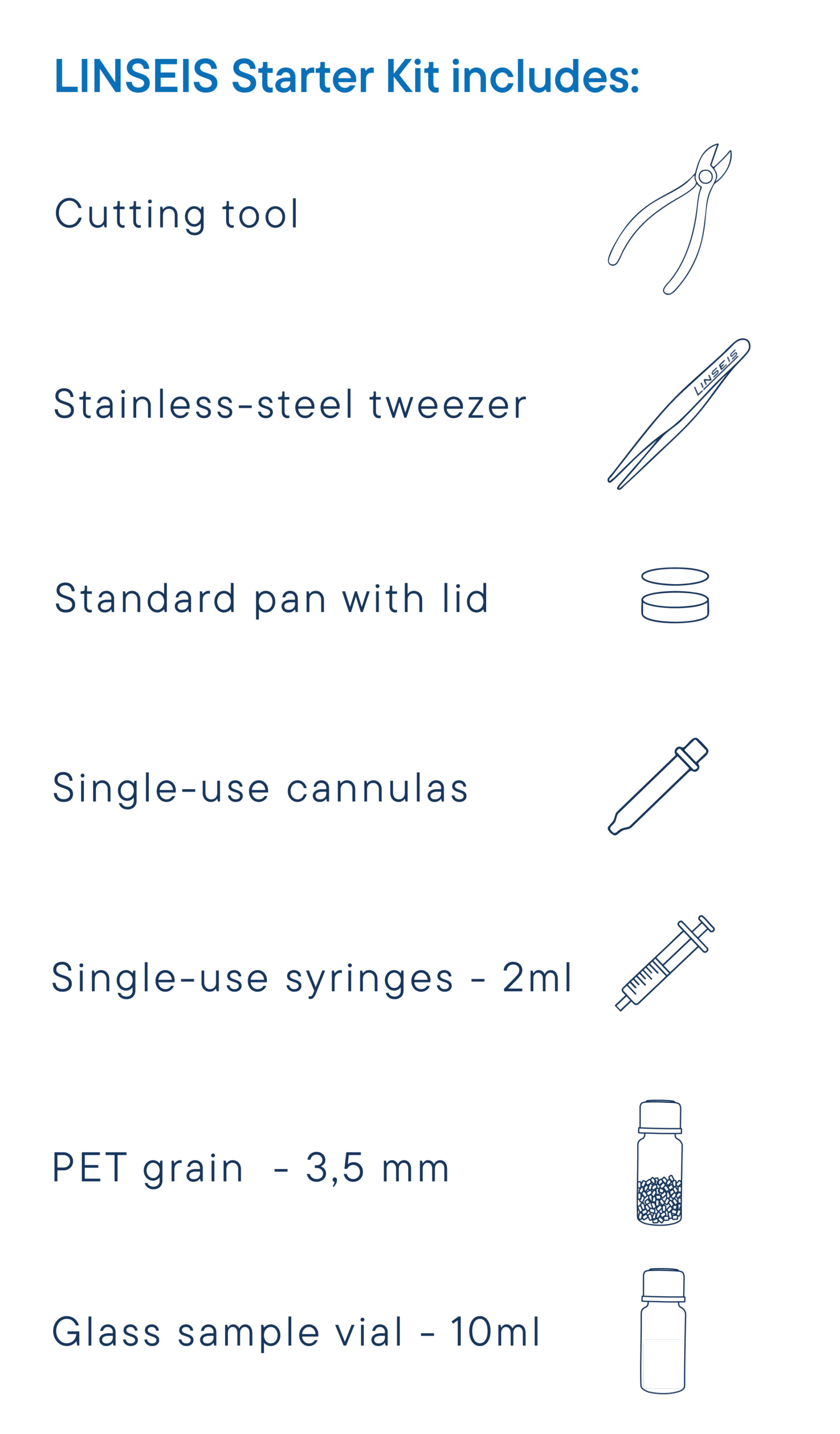
A special Starter Kit Advanced is available for the DSC L63, which contains all the important components for immediate operation of the system. The kit includes tools for sample preparation, reference materials and accessories for safe handling and initial calibration.
This ensures that you obtain reliable and meaningful measurement results right from the first use.
How much does a DSC L63 cost?
The price of a DSC system depends on the selected configuration and additional options, such as the temperature range, cooling system, automation features, or specialized measurement modes. Since each system can be tailored to your specific application needs, costs may vary significantly.
For an exact quotation, please use our contact form to send us your requirements – we will be happy to prepare a customized offer for you.
What is the delivery time for a DSC L63?
We usually have a standard DSC L63 configuration in stock, allowing for very short delivery times. If your system requires additional options or customized configurations, the delivery time will depend on the scope of these modifications.
Please contact us via our contact form for a precise delivery estimate based on your selected configuration.
What types of samples can be analyzed with a DSC L63?
The DSC L63 can analyze a wide variety of materials, including polymers, metals, ceramics, pharmaceuticals, food products, and composite materials. Typical applications include determining melting points, glass transitions, crystallization behavior, curing reactions, oxidation stability, and specific heat capacity.
Thanks to its wide temperature range and advanced measurement modes, the DSC L63 is suitable for both research and quality control across diverse industries.
What are the advantages of the DSC L63 compared to other differential scanning calorimeters?
The DSC L63 combines exceptional sensitivity and resolution with a uniquely wide temperature range (−170 °C to 750 °C) in a single setup, eliminating the need for hardware changes. Its true heat flow design and high-performance silver furnace ensure highly accurate and reproducible measurements, even for subtle thermal events.
Optional features such as Modulated DSC (MDSC), Optical DSC, and UV-curing DSC expand the range of possible applications, while an optional 90-position autosampler enables fully automated, high-throughput measurements. Flexible cooling options and comprehensive software support make the DSC L63 a versatile and future-proof solution for both research and industry.
Software
Making values visible and comparable


The software greatly enhances your workflow as the intuitive data handling only requires minimum parameter input. LiEAP offers a valuable guidance for the user when evaluating standard processes such as melting and crystallization points.
The optional thermal library product identification tool, provides a database permitting an automatic identification tool for your tested materials such as polymers.
Data acquisition
- Shared database:
One software for many devices - Compatible with the latest Windows® operating systems
- Online updates
- Automatic gas control for multiple gases and hardware types (Optional)
- Unlimited heating, cooling and dwell time segments
- Multi-language versions such as English, German, French, Chinese, Japanese, etc. (User selectable)
- Optional password protection and user access levels
- Simultaneous data acquisition and evaluation
Data evaluation
- Includes:
Signal correction and smoothing, derivate/ integral, arithmetic operations for curves, peak evaluation, glass point evaluation, onset-
point determination, multiple curve overlay, annotation and drawing tools, copy to clipboard function, multiple export features for graphic and data export, reference based correction. - Undo and redo function for all steps
- Complete evaluation history
- Export to various data formats
- Extendable via Python plugins
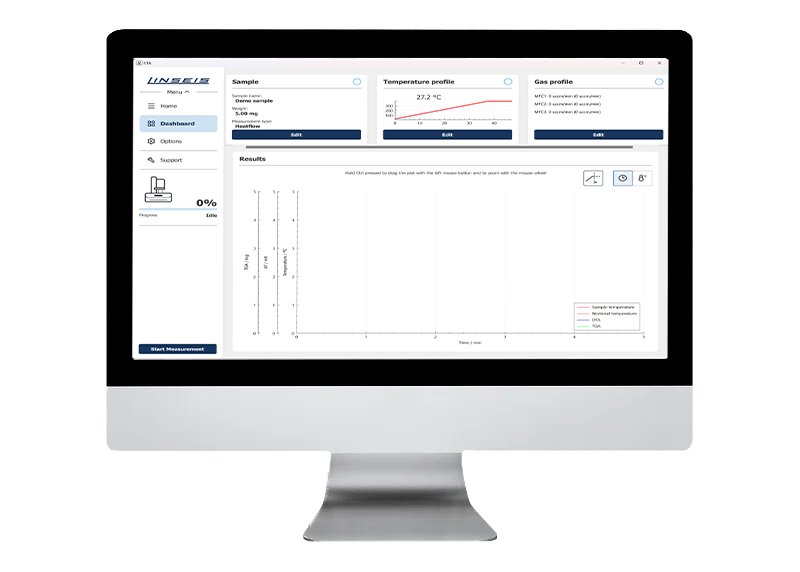
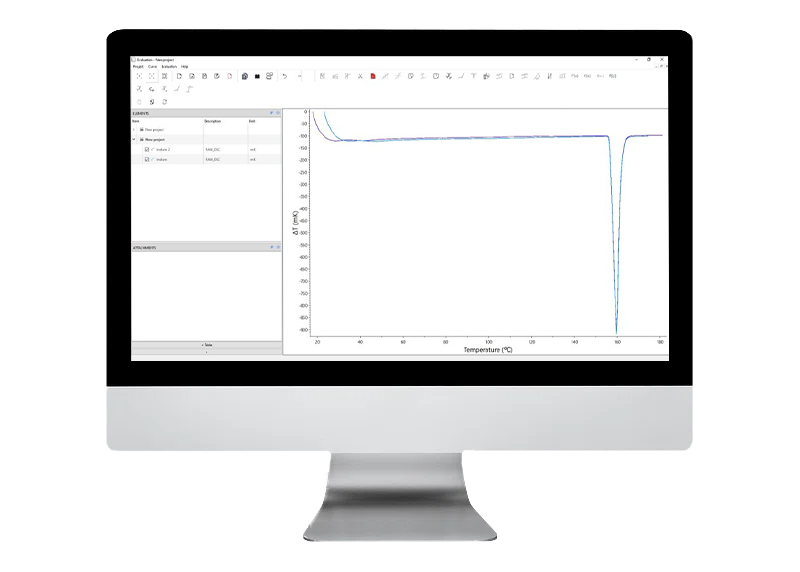
Applications
Application Areas
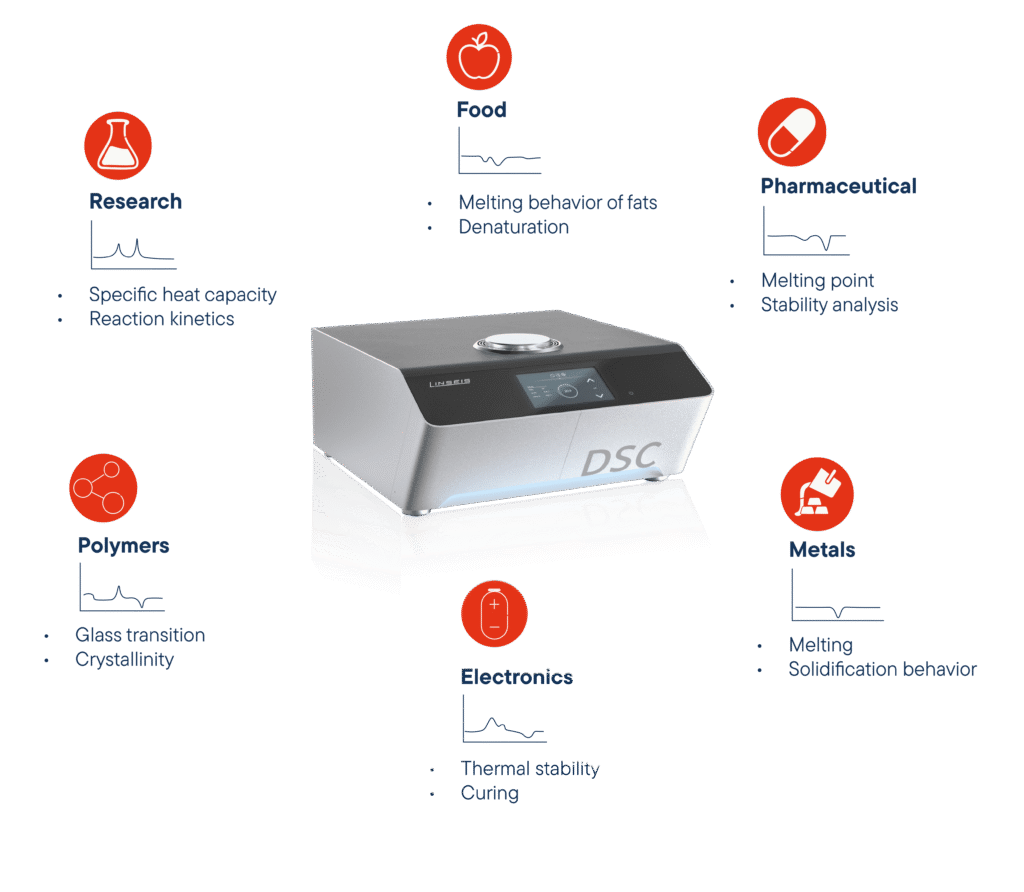
Cooling Rates
The new DSC system offers an innovative design with a wide temperature range from -170 °C
to 750 °C, without having to adjust the cooling options. This allows a more efficient workflow by eliminating time-consuming adjustments. The instrument enables seamless transitions
between low and high temperatures, making it ideal for demanding applications such as material research, polymer analysis, and quality control. With its high flexibility and user-friendly operation, this DSC sets a new standard for advanced thermal analysis.
In the graphs you can see how the cooling options with and Intracooler and an circulating thermostat ensures efficient and rapid cooling.
Application example: Cooling rate with an Intracooler
Cooling rate | Down to |
|---|---|
| 100 K/min | 560 °C |
| 50 K/min | 240 °C |
| 20 K/min | 40 °C |
| 10 K/min | -30 °C |
| 5 K/min | -48 °C |
| 1 K/min | -60 °C |
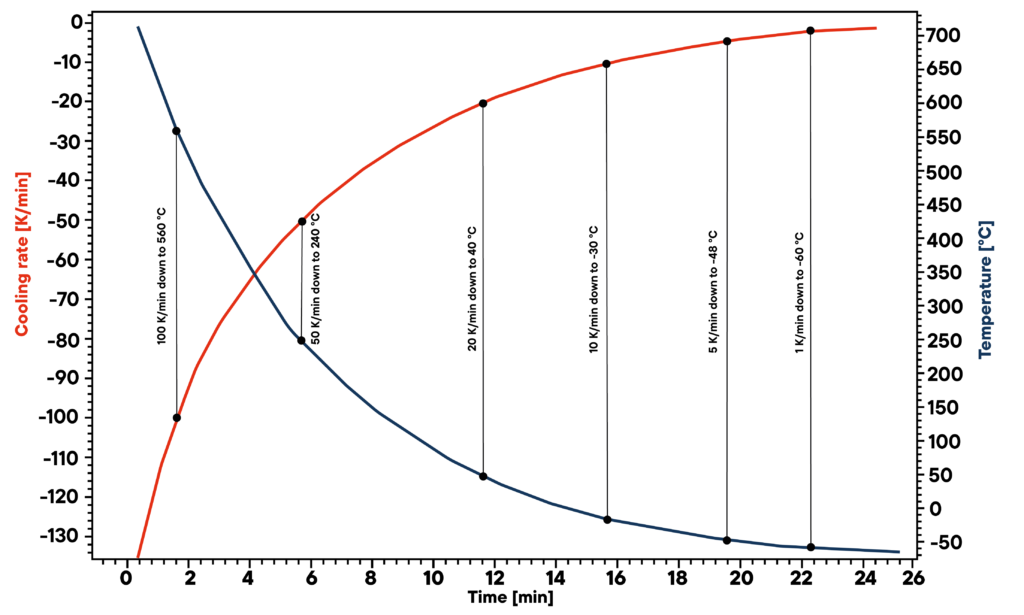
Application example: Cooling rate with an circulating thermostat
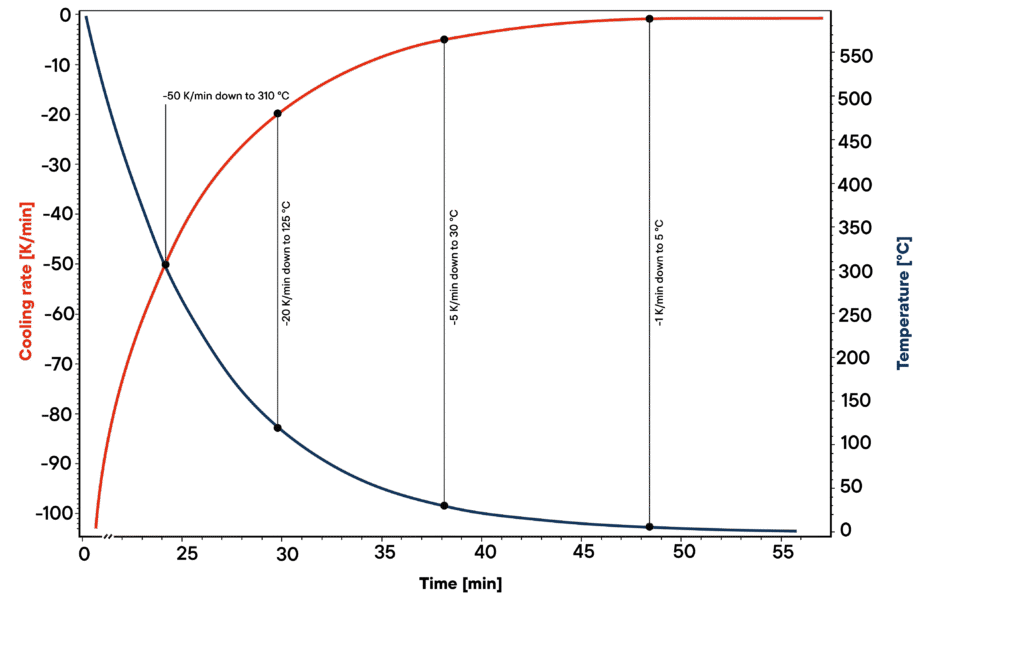
Cooling rate | Down to |
|---|---|
| 50 K/min | 310 °C |
| 20 K/min | 125 °C |
| 5 K/min | 30 °C |
| 1 K/min | 5 °C |
Polymers
Polymers are used in countless applications – from packaging and automotive parts to aerospace and medical devices. To ensure reliable performance, understanding their melting behavior, glass transition temperature, crystallinity, curing characteristics and oxidation stability is essential, as these properties directly influence mechanical performance, processing behavior and long-term durability.
The LINSEIS DSC L63 enables precise and reproducible analysis of these key thermal properties across all polymer types – including thermoplastics, thermosets and elastomers. Whether for product development, quality control or material comparison, DSC measurements help optimize processing parameters, improve product stability and support the selection of the most suitable material for each application.
Application example: PET Granulate 1. Heating
The analysis of polymers is one of the main applications of DSC. Effects such as glass transitions, melting, and crystallization points are of interest and often challenging to detect. The new LINSEIS L63 DSC offers high resolution and sensitivity, making it an ideal instrument for this type of analysis. With its innovative design, it is now possible
to analyze important properties of the sample even during the initial heating of the PET granulate using the L63 DSC at a linear heating rate of 20 K/min. The curve shows a significant glass transition around 80 °C, followed by a melting peak at 246 °C.
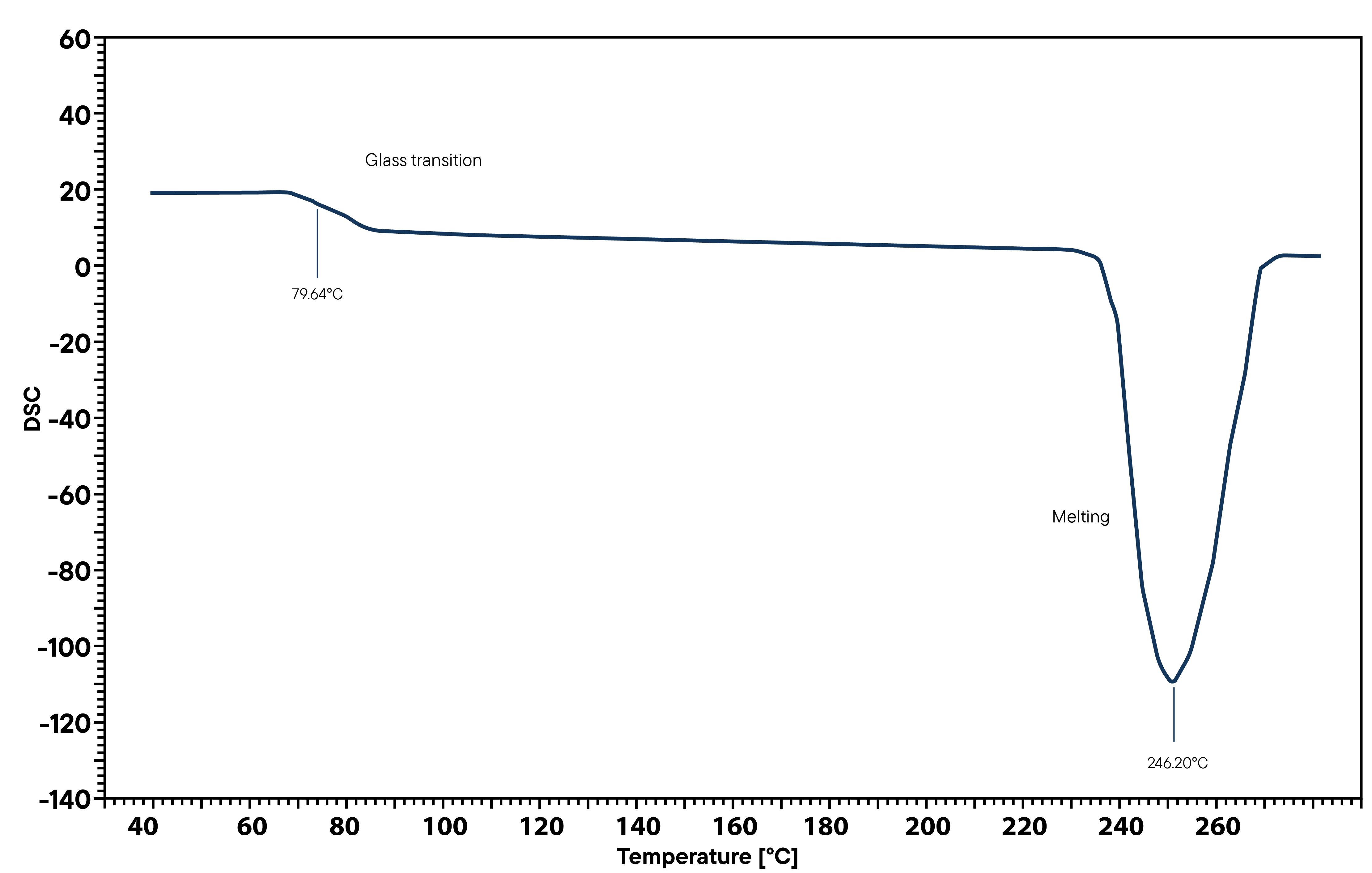
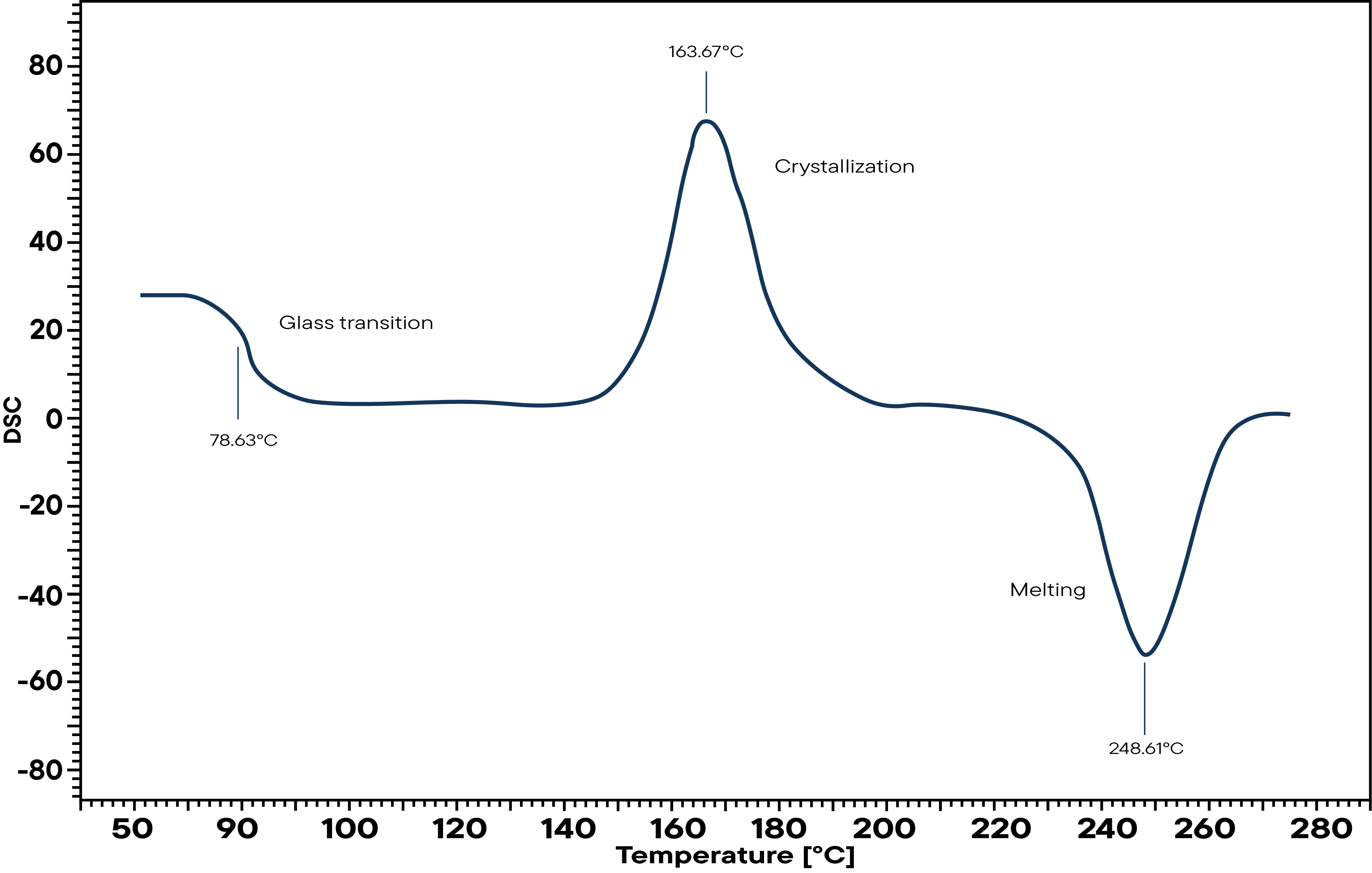
Application example: PET Granulate 2. Heating
Depending on the cooling rate, the degree of crystallinity of the polymer changes significantly. During a subsequent heating run, cold crystallization can be observed with a linear heating rate of 20 K/min. The curve reveals a distinct glass transition at around 80 °C, followed by cold crystallization of the amorphous regions starting at approximately 148 °C and a melting peak at starting 230 °C. This allows the complete characterization of the sample with just two heating cycles.
Well informed
